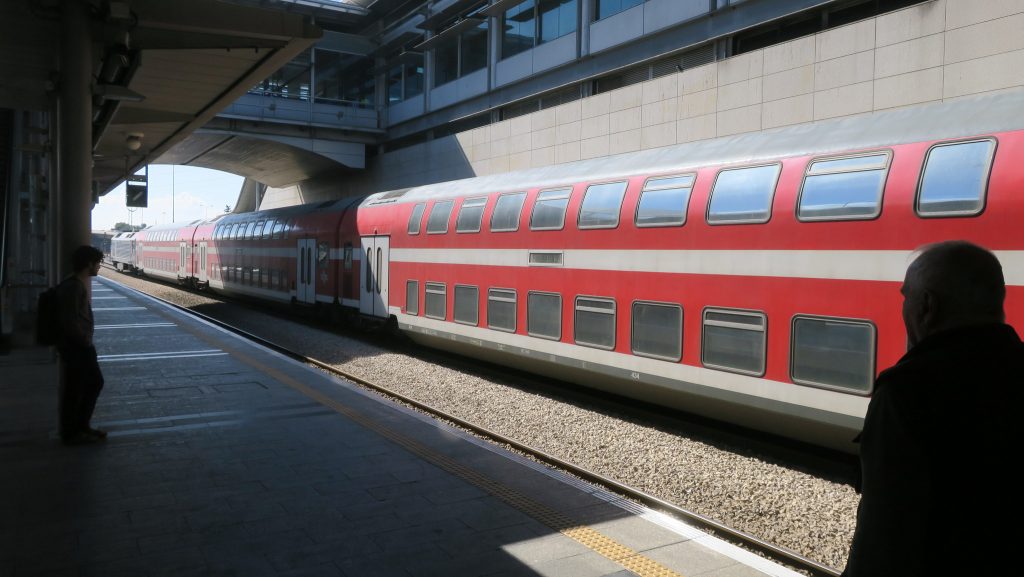The Israeli government on Wednesday announced a new NIS 30 million ($8.4 million) per year pilot program to invest in tech startups focused on impacting the transportation sector.
The program will be co-run and co-funded by the Israeli Ministry of Transportation, the Israel Innovation Authority and the Fuel Choices and Smart Mobility Initiative in the Prime Minister’s Office, and looks to promote companies aimed at improving transportation in Israel and the world, as well as to “develop Israel’s high-tech industry through technological innovation in the field of traffic systems and transportation infrastructure.”
SEE ALSO: Vroom, Vroom: Israeli Tech Is At The Forefront Of The Newest Mobility Trends
The initiative will look at companies working in a number of technological spheres, including autonomous vehicles, electric vehicles, connected vehicles, ridesharing and carpooling models, monitoring technologies and processing of traffic data, reducing traffic congestion and collisions, and encouraging the use of public transportation.
“While Israel’s innovation ecosystem has become a global role model, this has yet to seep into Israel’s own transportation system, which will continue to face significant challenges for the near future, Israeli Minister of Economy and Industry Eli Cohen said in a statement.
“We believe that Israel’s transportation system needs a significant boost and by launching this pilot program, we are enabling the industry to open new avenues, and for startup companies in the transportation sector to grow and mature,” he added.
The participating startups will receive financial support of between 20 percent and 50 percent for approved R&D expenses – with additional support of up to 75 percent of R&D expenses “for projects which can demonstrate significant potential to streamline and improve transportation within Israel,” according to the statement.
The Ministry of Transportation said it will offer additional support by “helping the companies with the regulatory requirements needed to carry out their pilots and by increasing access to new fields of activity” which will also “enable the government to innovate its regulatory approach, to swiftly adapt to technological change, and to foster steady and balanced growth for startups as well as the Israeli economy.”
“The goal of the program is to provide tech companies with funding for the advanced stages of development necessary for commercializing new innovations and introducing them to the market,” said Chief Scientist at the Israel Ministry of Economy and Industry and Chairman of the Israel Innovation Authority Dr. Ami Appelbaum.
“It is intended to provide access to infrastructure, data and sites where government has access and regulatory oversight, which are less accessible for this very reason. This way, companies can test and develop innovative technologies in these arenas, with government agencies promoting regulation to support these initiatives.”
Israel Innovation Authority CEO Aharon Aharon said: “The claim is often made that regulation and not technology is what prevents our world from transforming in the way many technology leaders are predicting. For this purpose, the Israel Innovation Authority is joining together with the transportation industry to spur the type of innovation which has advanced beyond the laboratory towards trial environments by focusing on such pilots.”
The Minister of Transportation and Minister of Intelligence, Yisrael Katz said that “technology is progressing by leaps and bounds, and it is our governmental duty to guide these advances from a regulatory standpoint so that they can be implemented as soon as possible.”
Sign up for our free weekly newsletter
SubscribeIsrael’s public transportation system
The new initiative appears to be aimed at leveraging Israel’s tech prowess to address its transportation sector shortcomings. The country is home to a number of prominent companies operating in the transport tech sector, including Waze, Moovit, and Mobileye, among many others.
But transportation in Israel is largely based on the use of private cars, which creates massive traffic jams across the country, and particularly in the center – Israel’s economic hub. In fact, Israel has the highest road congestion of any OECD country by a wide margin, according to OECD figures from 2014.
The public transit infrastructure, meanwhile, lags behind other developed countries in the OECD by about 25 years, according to a 2014 study by the Knesset Research and Information Center. Government investments in public transport have also been lacking and the study found that to narrow the gap, Israel will have to invest some NIS 256 billion in public transport infrastructure.
Last month, the International Monetary Fund (IMF) gave Israel an “unsatisfactory” rating in public transportation. In an in-depth report, the IMF stated “the public transport infrastructure in major cities is clearly inadequate for Israel’s income level, failing to meet the needs of a growing population concentrated in the urban areas of central Israel.”
The IMF said that one of the strongest incentives to own private vehicles in Israel is the lack of public transport on weekends and religious holidays. The issue of transportation and any economic activity on the Sabbath, according to Jewish law, is politically sensitive and construction or repair of train lines on weekends has led to government crises a number of times over the years.
Israel is in the midst of a large transportation overhaul, the Infrastructure 2030 plan, which is “expected to target a denser network of urban rail transport, including, underground lines in Tel Aviv, a high-speed link between Tel Aviv and Eilat, and new airports in the north and south of the country.”
SEE ALSO: How Israeli Transportation Technologies Are Powering New York City Taxicabs
But projects have been battered by delays and ballooning costs.
Israel’s opening of the long-awaited, high-speed, Jerusalem-Tel Aviv rail line, which was set for September 2018, has been pushed back to next year. The 30-minute line is expected to be a game-changer for commuters.
Meanwhile, the Greater Tel Aviv light rail project, which renders Tel Aviv a nightmare to navigate, but will connect the surrounding suburbs and cities more efficiently, is expected to be completed by 2024, with the first lines operational by 2021. Observers say it will likely not meet those schedules or meet the initial budget of NIS 17 billion ($4.7 billion).
Related posts

Editors’ & Readers’ Choice: 10 Favorite NoCamels Articles

Forward Facing: What Does The Future Hold For Israeli High-Tech?

Impact Innovation: Israeli Startups That Could Shape Our Future






Facebook comments